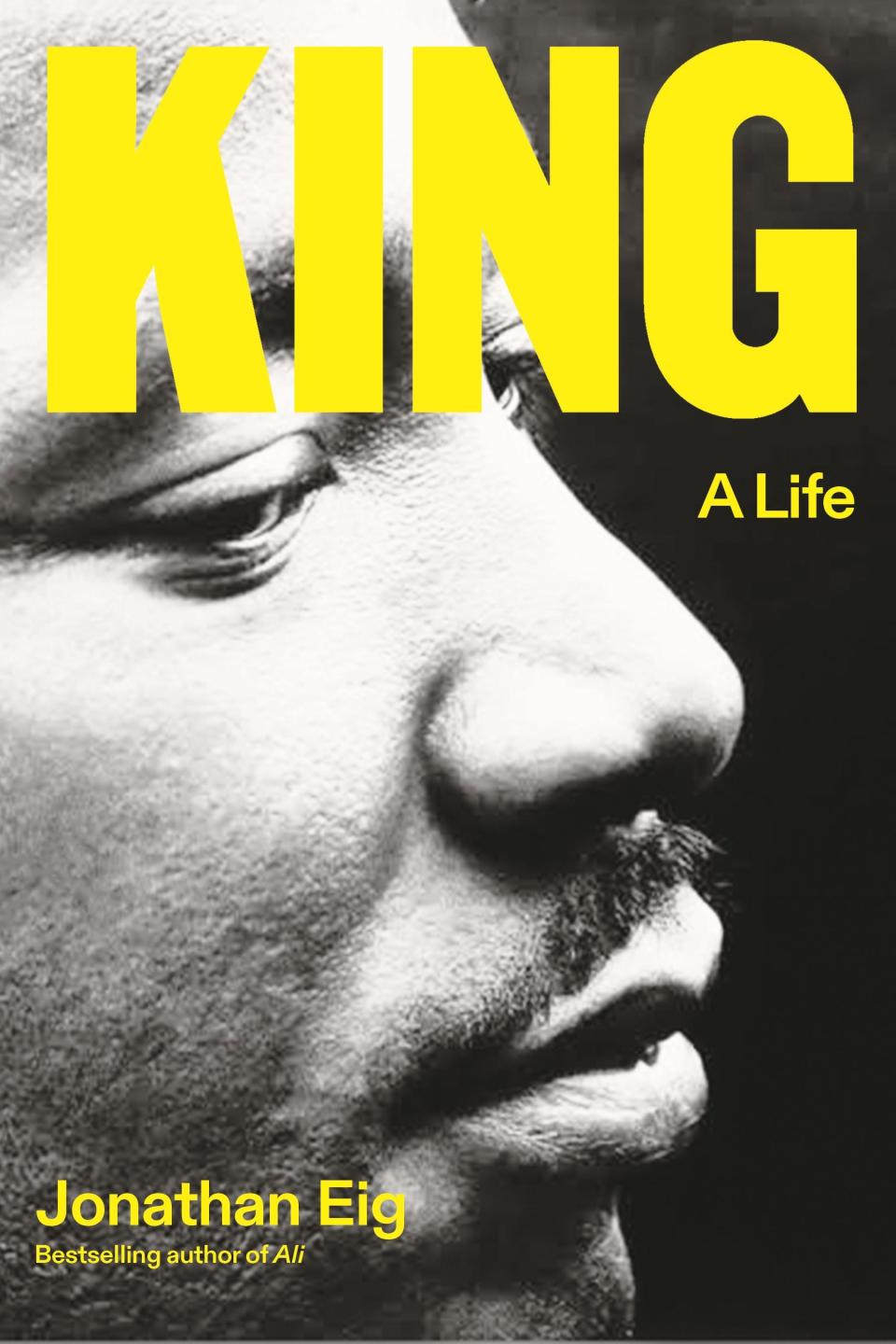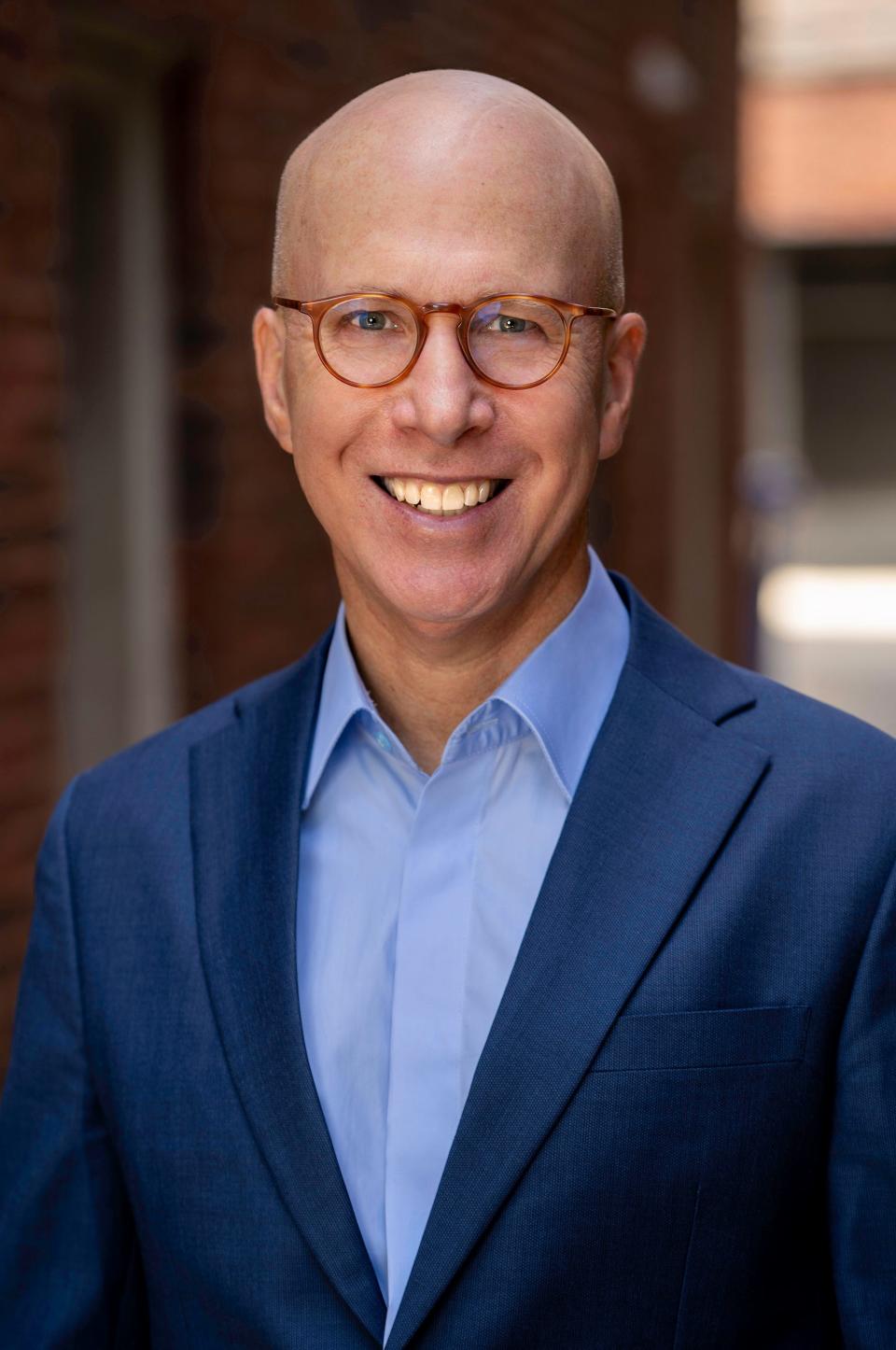MLK biographer Jonathan Eig, a Rockland native, to talk about King, take questions
- Oops!Something went wrong.Please try again later.
- Oops!Something went wrong.Please try again later.
Jonathan Eig, whose new bestseller "King: A Life" has been called the definitive biography of the civil rights leader, is coming home to Spring Valley on Thursday night, if only via Zoom.
The journalist and biographer will talk about the King biography in a virtual discussion moderated by Mondaire Jones, a former congressman who is vying for the Democratic ticket in the 17th Congressional District, and a fellow Spring Valley High School graduate.
Historian and filmmaker Ken Burns hailed Eig's latest book as "a kind of miracle."
"Here is the King we know, think we know, and ought to know," Burns wrote. "Here is the leader, the preacher, the orator, the husband, the father, the martyr, the human being — not with melodramatic halo in place, but in all his heroic, tragic glory. Hallelujah!"

The choice of Thursday's virtual venue — Finkelstein Memorial Library's website — is important to Eig, he said, as the library played an outsized role in his early years, fueling his love of sports and music and, indirectly, history.
The Zoom discussion is at 7 p.m. Aug. 24. Registation is limited to the first 98 participants who sign up. After the discussion, Eig will answer questions from the virtual audience. Register on the Finkelstein Memorial Library website, www.finkelsteinlibrary.org.
Eig now calls Chicago home, but he grew up in Airmont, where his parents still live. The Journal News/lohud spoke by phone with Eig on Tuesday. Here's part of that conversation, edited for space and content.
Peter Kramer: You'll be back at Finkelstein Memorial Library on Thursday. That place is important to you.
Jonathan Eig: Yeah, I spent a lot of time there. We didn't really have books at my house. We had an encyclopedia set and that was about it. We got everything from Finkelstein. I would just tear through whole sections at a time. And the records, too. I went alphabetically through the record collection there and took out everything from the jazz and rock sections. Finkelstein was a huge part of my education and my acculturation.
PK: Is there an artist or singer that you were turned on to there that you connect to Finkelstein?
JE: Absolutely. I was a trumpet player, so I started playing trumpet in fourth grade at Monsey Elementary School. And so I started with the trumpet players: Louis Armstrong, going through alphabetically to Gillespie and on. I basically worked my way through all the jazz trumpeters. I was just listening to Armstrong when you reached out.
PK: The library gave you a whole other education.

JE: Absolutely. Looking back on it, I learned a lot of history by starting with sports and music. I was picking up mostly sports books at the beginning and then records. That's an interesting way to place yourself in history and learning why these guys came along when they did and what the world was like when they came along and how the music changed. I think that's a big part of how I began to understand history.
PK: Putting them in the context of their time?
JE: Exactly. Like why was Louis Armstrong considered sort of old-fashioned by guys like Dizzy Gillespie? Why was Miles Davis speaking out on racial issues when those other guys really weren't? How had the world changed and how was that reflected in their lives and in their music?
PK: That really sums up what you gave us with "Ali: A Life," and now, with "King: A Life." You put them in their time and explained and explored their time through them.
JE: I think as somebody who's not trained in history, but someone who's a journalist and someone who comes at it through culture, I don't take that for granted. I think it's really important to help people understand the world around these figures so that they're not born in a bubble.
PK: An early moment in "King" that resonated with me is when he goes to Pennsylvania and he looks at black people and white people sitting in the same restaurant. There's none of the division he has grown up with. It's a real moment for him, isn't it?
JE: Yes. And you could just try to imagine what it's like to be born in the South as a black kid and feel like you've got a pretty privileged life. He's not poor. He's not too badly beaten by racism of that era. And then you go north and you see, "Oh, my God, it's like another country." And then you spend enough time there that you realize, "Oh, well. It sure ain't perfect."
PK: It must have been hard for him to go back, and realize that he's going back to that other country, that first country he was raised in.
JE: But he wants to. He didn't have to. He could have stayed in Boston. He had job offers in the North. He wanted to. From an early age, he knew he wanted to fight and that meant going back and taking to the front lines of the battle.
PK: You really synthesize what other people have written about him, what other people have said. You take ownership of the story by borrowing the best bits from what other people have written. How long did you work on the book?
JE: This is six years of work. I had the advantage of all those people who came before me. Some of them even reached out and offered help, people like (King biographers) David Garrow and Lewis Baldwin, they served as mentors to me. You have to take advantage of the fact that so many people have done so much work before you. And that gives me a great leg up.
PK: Have you been surprised by the response to the book?
JE: I can't believe how lovely the response has been. People have been incredibly kind and complimentary. I think the best part is that people are really loving King in a new way, that they're embracing his human characteristics. I think they like him and appreciate him more when they see him as a flawed person like the rest of us. That's been really rewarding for me. I wasn't sure that was going to happen, to be honest.
PK: Was that a concern for you going in, that you wanted to give him to us, warts and all, and you were concerned about how people would take it?
JE: My No. 1 goal was to create a more human portrait and to make him more relatable to people. And I worried that, as a result of that, some people might protest: "He's a saint. He's a hero. Don't mess with him." But that has not been the case. And I feel really gratified about that.
PK: Was there one thing you learned along the way that kind of blew you away?
JE: There were a lot of things. I was blown away by how many times he was hospitalized for what he called exhaustion. I was blown away by how obsessed not just J. Edgar Hoover but the entire federal government was with destroying him. And I was surprised at how much of an impact that had on King, psychologically, just forget about what it did to the country and what it did to the civil rights movement. It had a real toll on him emotionally, and I was not really prepared for that.
PK: I was surprised to learn that as a boy, King twice threw himself out of a second-story window when things overwhelmed him, how fragile he was early on.
JE: This is a deeply emotional person.
PK: You have chronicled other icons. Muhammad Ali and Lou Gehrig and now King. What is the value in holding them up for scrutiny?
JE: I think there's a couple of things. One, these are people everybody knows. There's a built-in audience. It gives you a chance to use their lives to rethink their personalities and their impact, but also to reframe all of American history. We can look at Ali now and really understand his impact as a Muslim, as a member of the Nation of Islam, as well as a boxer, and how that shaped our country. You couldn't do that in the 1980s. You need some time to go by before you can make those kinds of assessments. People relate to biography because it forces you to think about someone other than yourself and to try to imagine what goes on in their lives and in their minds. That's a really valuable process. It's easier than a big history book that tries to explain everything about the 20th century or everything about religion or everything about the civil rights movement.
PK: King gives us a window into all of that.
JE: Yes. It's a way in.
PK: If you had the opportunity to sit down with Dr. King, knowing all you know about him now, what would you ask him?
JE: Wow. I would ask him why he never quit. I think the answer might be the Bible. I think the answer might be that he truly acted on what he believed. But a lot of people believe in the Bible and a lot of people believe in God, but they're not willing to sacrifice their lives for it. And he had so many opportunities where he could have stepped back, where he could have at least reduced his role. So I guess I would just ask him if he ever thought about acting a little more selfishly.
Biographer Jonathan Eig will discuss his bestselling book "King: A Life" at 7 p.m., Aug. 24 on a Zoom event co-sponsored by Finkelstein Memorial Library and the Martin Luther King Multi-Purpose Center in Spring Valley. Registration is required and access is limited to the first 98 people who sign up at https://finkelsteinlibrary.org. After the discussion, Eig will take questions from those on the call.
Register directly at this link.
This article originally appeared on Rockland/Westchester Journal News: Jonathan Eig wrote bestselling MLK bio. Now, he'll take questions.

